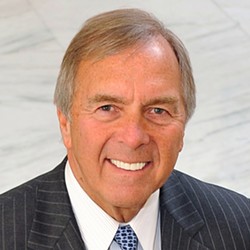Voters are angry — disappointed with politicians, the "establishment" and anything connected to the federal government. They're frustrated that the two major political parties have refused to reach across the aisle in Congress to find common ground and avoid legislative paralysis. The Iowa caucuses confirmed this anger, as new candidates emerged victorious — Ted Cruz and Donald Trump for Republicans, and Hillary Clinton (just barely) and Bernie Sanders for Democrats.
The majority of caucusgoers supported a Republican ideologue, a Democratic socialist, an entrenched liberal who is anything but an "outsider" to Washington politics and a billionaire businessman/TV personality who has masterfully spoken to American fears. The unfortunate irony is that American voters, as demonstrated in Iowa, are supporting the very candidates who would perpetuate our nation's polarization.
As a political beneficiary of voter anger in 1994, I can testify that there was then an ideological outlet for that anger. The Contract With America was a political pledge to voters stating what candidates would do if voters elected and trusted them to serve honorably. The Contract promised that a set of principles would be voted on within the first 100 days of members being sworn in. The Contract's provisions had been poll-tested, and all had at least 80 percent public support. In the first 100 days of the 104th Congress, the Contract was fulfilled, the federal budget was balanced for four years and the national debt was reduced by $500 billion. Promises made were promises kept.
For a time, voters supported the first Republican Congress in 40 years, but then the ways of Washington returned — unbalanced budgets, fiscal irresponsibility and overspending — and voters replaced Republicans in 2006, only to later replace Democrats once voters understood their policies.
Now Republicans are back in charge of the House and Senate, in part to blunt the political philosophy of President Obama, a philosophy that many Americans find both unpopular and polarizing. Still, voters need more. This year, the presidency stands on the brink of changing back to more traditional patterns of governance — fewer (hopefully) executive orders that bypass Congress, more spending control and greater assertion of American influence across the globe.
But America is still polarized. The vote in Iowa demonstrated at least that newcomers — a strict conservative (Cruz) and an unapologetic liberal (Sanders) — are popular in America's heartland. It also showed the strength of a candidate (Trump) who's a master at mobilizing Americans by tearing down rather than building up, feeding their anger while promising greatness. Along with empty promises, Trump's bold criticisms of anyone who dares challenge him may lead to his political downfall. But the crowds he draws and the polling support he enjoys illustrate that Americans are fed up with politicians and initially willing to entertain the idea of an Entertainer-in-Chief.
Today, however, Iowa's victors speak in simplistic terms about complex national issues — and the political season is lengthy, giving voters a chance to flirt with ideologues.
Cruz: "I'll carpet-bomb ISIS." "I'll rip Obama's executive orders to shreds."
Trump: "I'll make America great again." "No Muslims will be able to enter America."
Sanders: "Let's tax the rich." "Wall Street will be under control when I'm president."
Hillary: "I'll go farther than Obama." "Free college tuition for everyone."
Such declarations feed the extremes and rally "the base." But on November 8, 2016, voters will cast their ballots in one of the most pivotal presidential elections in American history. At stake is the security of the United States, including economic security, tax and environmental policy, the livelihood of families everywhere, the healing of racial tensions in a coarse world and American leadership all over that world.
President Lyndon Johnson once said, "It's not doing what is right that's hard for a president. It's knowing what is right."
We Americans want a president who knows what is right, believes it deeply and is in sync with the thoughts of most Americans. Polarizing figures may temporarily satisfy their segment of the electorate, allowing supporters to blow off steam, but America's presidents owe the entire nation a commitment to do what's right for the majority, recognizing that circumstances often trump ideology in modern times.
Sober times in today's world require sober judgments by voters, too, driven not by anger or frustration, but by knowledge and understanding borne of study and experience. We must expect the best of our leaders, but also realize the difficulty of leading more than 320 million Americans through the minefields of public policy.
If we choose wisely this year, we enhance the likelihood that the United States will endure for centuries to come. ♦





















